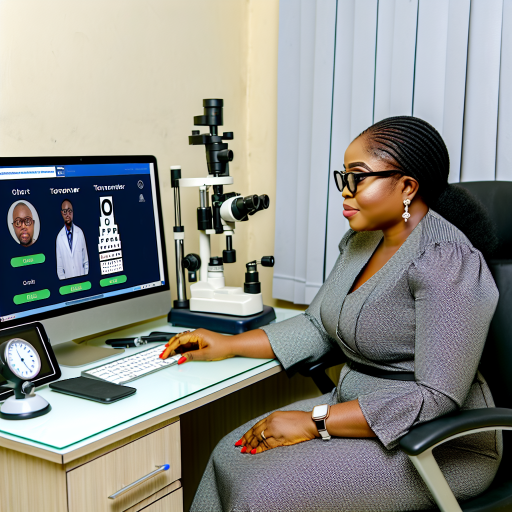Introduction
Veterinary medicine plays a crucial role in the health and well-being of animals.
It involves the diagnosis, treatment, and prevention of diseases and injuries in a variety of animal species.
Brief Explanation of Veterinary Medicine
Veterinary medicine encompasses a wide range of disciplines, including surgery, internal medicine, pathology, radiology, and preventive medicine.
Veterinarians work tirelessly to ensure the health and welfare of animals.
Importance of Veterinary Medicine in Society
Veterinary medicine is essential for maintaining the health of both domestic and wild animals.
It also plays a crucial role in public health by preventing the spread of zoonotic diseases from animals to humans.
Thesis Statement on the Significance of Veterinary Medicine in Nigerian Society
In Nigerian society, veterinary medicine is of utmost importance as it not only affects the health of animals but also impacts the livelihoods of many individuals who rely on animal husbandry for their sustenance.
Veterinary Medicine in Agriculture
Veterinarians play a crucial role in maintaining the health and well-being of animals in Nigeria.
They are responsible for diagnosing and treating illnesses, performing surgeries, and administering vaccinations to prevent diseases.
By providing preventive care and treatment, veterinarians help to ensure that livestock remain healthy and productive.
Impact of Healthy Livestock on Food Production
Healthy livestock are essential for sustainable food production in Nigeria.
When animals are free from diseases and parasites, they can grow and reproduce more efficiently.
This leads to increased meat, milk, and egg production.
Such outcomes benefit farmers and ensure a stable food supply for the population.
Contribution to Economic Growth and Food Security in Nigeria
The veterinary medicine sector plays a significant role in the economic growth and food security of Nigeria.
By maintaining the health of livestock, veterinarians help to increase agricultural productivity.
This boost in productivity can, in turn, enhance the economy.
Additionally, by ensuring that animal products are safe and free from diseases, veterinarians contribute to food security.
They provide healthy and nutritious food options to the population.
Veterinary Medicine in Public Health
One of the significant roles of veterinary medicine in Nigerian society is in public health.
By focusing on animal health management, veterinarians play a crucial role in preventing zoonotic diseases.
- Preventing zoonotic diseases through animal health management
- Controlling the spread of diseases from animals to humans
- Importance of vaccinations and disease surveillance in public health
Veterinarians work to monitor and manage the health of animals to prevent the transmission of diseases to humans.
This proactive approach is vital in protecting public health.
Through disease surveillance, veterinarians can identify potential threats and take necessary actions to prevent outbreaks that could impact human populations.
Vaccinations are also essential in controlling the spread of diseases.
By vaccinating animals against common diseases, veterinarians can reduce the risk of transmission to humans.
This preventive measure is crucial in maintaining public health and preventing epidemics.
The role of veterinary medicine in public health cannot be overemphasized.
Through proactive management of animal health, disease surveillance, and vaccination programs, veterinarians contribute significantly to protecting the well-being of both animals and humans in Nigerian society.
Find Out More: Top Ophthalmology Clinics in Nigeria: Where to Find the Best Care
Conservation of Endangered Species through Veterinary Care
Veterinarians are essential in the preservation of endangered species in Nigeria.
They provide medical care, monitor population health, and implement breeding programs to increase the numbers of endangered species.
Role of Veterinarians in Wildlife Rehabilitation and Protection
Veterinarians are at the forefront of wildlife rehabilitation efforts in Nigeria.
They treat injured and sick animals, rehabilitate them for release back into the wild, and ensure the overall well-being of wildlife populations.
Importance of Preserving Biodiversity in Nigeria’s Ecosystems
Preserving biodiversity is crucial for maintaining the balance of ecosystems in Nigeria.
Veterinarians play a key role in ensuring the health and survival of various species, which are integral to the functioning of ecosystems.
Veterinary medicine is essential for the conservation of wildlife in Nigeria.
Veterinarians contribute significantly to the protection of endangered species, rehabilitation of wildlife, and preservation of biodiversity in the country’s ecosystems.
Learn More: Importance of Child Dental Health in Nigeria
Veterinary Medicine in Livelihoods
Veterinary medicine plays a crucial role in supporting the livelihoods of farmers and animal breeders in Nigeria.
Transform Your Career with Expert Guidance
Get personalized mentorship consulting that’s tailored to your unique path. Our expert advice is actionable and exclusive.
Get StartedBy providing essential healthcare services to livestock and pets, veterinarians contribute to the overall well-being of these animals.
These animals are often integral to the livelihoods of many households.
Animals such as cows, goats, and chickens are a source of food and income for many Nigerians.
Farmers rely on their livestock for sustenance and as a means of generating income through selling meat, milk, and other animal products.
Therefore, the health and well-being of these animals are paramount to the economic stability of these individuals and communities.
Veterinarians work closely with farmers and animal breeders to prevent and treat diseases.
They provide vaccinations and offer guidance on proper animal nutrition and husbandry practices.
This partnership ensures that animals remain healthy and productive.
Ultimately, this benefits the livelihoods of those who depend on them.
Another critical aspect of veterinary medicine in Nigerian society is its role in promoting sustainable practices in animal husbandry.
Sustainable agriculture and livestock management practices are essential for long-term environmental and economic sustainability.
Veterinarians play a key role in educating farmers and animal breeders on environmentally friendly farming techniques.
They also teach responsible use of resources and animal welfare standards.
By advocating for sustainable practices, veterinarians help ensure that Nigeria’s agricultural sector remains viable and productive.
Additionally, veterinarians work to improve animal breeding practices, disease prevention strategies, and overall animal health management.
This enhances the efficiency and sustainability of livestock production in the country.
This holistic approach to animal husbandry benefits not only farmers and animal breeders but also broader society.
Furthermore, veterinary medicine plays a vital role in promoting animal welfare and ethical treatment of animals in Nigerian society.
Animals have intrinsic value and deserve to be treated with compassion and respect.
Regardless of their economic or utilitarian value, they deserve protection.
Veterinarians advocate for the humane treatment of animals.
They raise awareness about animal rights and work to prevent cruelty and abuse towards animals.
Veterinarians are often at the forefront of efforts to improve animal welfare laws and regulations.
These initiatives ensure that animals are protected from unnecessary suffering and harm.
In addition to addressing physical health issues, veterinarians also prioritize the mental and emotional well-being of animals.
They recognize the importance of reducing stress, providing enrichment, and creating conducive living environments for animals in their care.
By promoting humane treatment and ethical practices, veterinarians foster a culture of respect and compassion towards animals.
Find Out More: Nigerian Oral Health Education for Kids

Challenges in Veterinary Medicine in Nigeria
One of the major challenges facing veterinary medicine in Nigeria is the lack of infrastructure and resources.
This shortage hampers the ability of veterinarians to provide adequate care to animals and, by extension, the society.
Veterinary hospitals and clinics are often ill-equipped, lacking basic facilities such as diagnostic equipment and medication.
Without proper resources, veterinarians struggle to diagnose and treat various animal diseases effectively.
Another significant challenge is the limited access to veterinary services in rural areas.
Many remote communities in Nigeria do not have easy access to veterinary clinics or professionals.
This lack of access means that livestock in these areas may not receive essential vaccinations, preventive care, or treatment for illnesses.
As a result, animal health suffers, impacting the livelihoods of farmers and the overall economy.
Furthermore, there is a pressing need for investment in veterinary education and training in Nigeria.
The current curriculum and training programs for veterinarians in the country may not adequately prepare them to address the diverse and evolving needs of animals and society.
By investing in modernizing veterinary education, the quality of care provided by veterinarians can be improved.
This improvement will lead to better animal health outcomes and ultimately, a healthier society.
Addressing the challenges facing veterinary medicine in Nigeria requires a multi-faceted approach.
Improving infrastructure and resources, expanding access to veterinary services in rural areas, and investing in veterinary education and training are critical steps.
These steps will enhance the role of veterinarians in Nigerian society.
Gain More Insights: Radiographers’ Contribution to Nigerian Medicine
The Importance of Veterinary Medicine in Nigeria
Veterinary medicine plays a crucial role in Nigerian society.
Veterinarians are responsible for ensuring the health and well-being of animals.
This responsibility has a direct impact on public health.
It also affects the environment.
Without the services provided by veterinary professionals, the overall health of the nation would be at risk.
Therefore, it is essential for the government to prioritize and invest in veterinary services.
Such investment supports the work of veterinarians in Nigeria.
By allocating resources and funding to this sector, the government can enhance disease surveillance, prevention, and control efforts.
This ultimately safeguards the health of both animals and humans.
It is important to recognize and appreciate the dedication and hard work of veterinarians in Nigeria.
Their expertise and commitment are vital in maintaining the health and sustainability of the country’s animal population.
As such, there is a dire need for continued support and recognition of their contributions to society.
The importance of veterinary medicine in Nigerian society cannot be overstated.
This field serves as a cornerstone for animal, public, and environmental health.
It is imperative that government, stakeholders, and the public alike come together.
They must provide the necessary resources and support for veterinary services in Nigeria.
Additional Resources
Parasites of importance for human health in Nigerian dogs: high …
Operationalising One Health in Nigeria: Reflections From a High …




